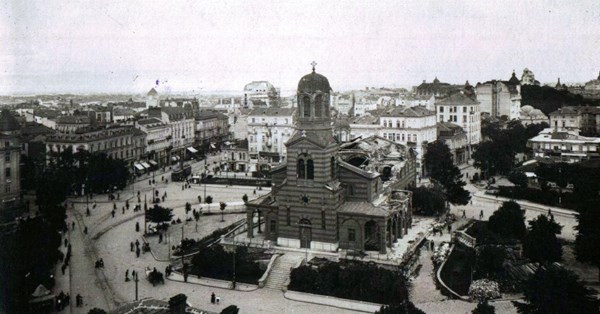THE Bulgarian Orthodox Church has marked the centenary of one of Europe’s worst terrorist attacks, when up to 250 people were killed and hundreds were injured by a bomb in the St Nedelya Cathedral, Sofia.
“The audacious murder of members of the kingdom of Bulgaria’s state and military leadership in a holy temple of God, alongside numerous innocent victims, including children, was a grave sin and crime,” the new Patriarch of Bulgaria, Daniil (Nikolov), said.
“Sin can be forgiven, with deep and sincere repentance, but crimes must be remembered so they are not repeated; and, in the memory of our Orthodox Church and people, this for ever remains a shameful stain.”
The message for the anniversary of the Holy Thursday bomb attack, which brought down the central dome of the Bulgarian capital’s 19th-century cathedral, was issued on Wednesday of last week.
The atrocity was an act of “cold-blooded, godless audacity”, he said, which continued to “numb hearts and terrify consciences” even a century later, along with the “cruelty and inhumanity” meted out to its victims.
“Committed on the eve of Christ’s resurrection, the attack on this Orthodox church is emblematic of the depth to which sin penetrates human nature and obscures God’s image in our consciousness.
“Human history unequivocally testifies that no question or problem has ever found a true and lasting solution through violence. Violence begets new violence, and violent death begets more violent death — such is the logic of the world.”
The bombing, aimed at Bulgaria’s political and military elite, was carried out by operatives of the banned Bulgarian Communist Party’s military wing during the state funeral of General Konstantin Georgiev, assassinated 12 days earlier by communist insurgents.
The single blast and roof collapse killed 213 mourners instantly, and injured about 500 others, dozens of whom later died, but failed in its aim of eliminating Bulgaria’s government and Tsar Boris III.
The atrocity, which was not officially approved by Georgi Dimitrov and other Communist Party leaders, was followed by the imposition of martial law and mass executions. The Party finally gained power two decades later, after a coup in 1944, and began a 43-year rule during which 20,000 “enemies of the people”, including many prominent Christians and church leaders, were imprisoned and killed.
In his address, Patriarch Daniil said that his Church had offered prayers every year over the past century “both for the victims of this and similar crimes, and for all those who allow themselves to be used as instruments of the destructive power of evil”, testifying that Bulgarians “recognised the sins of their ancestors” and showed “determination and will for change”.
















